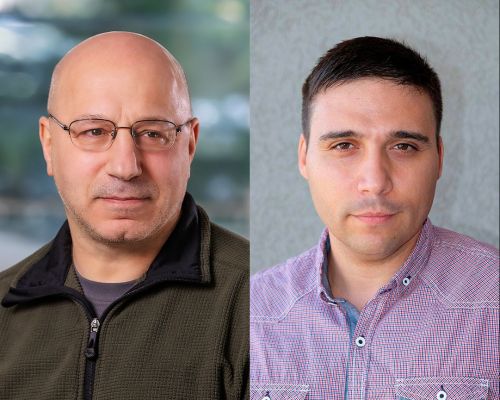Alaina O'Regan, Office of the Dean for Research
Catherine Zandonella, Office of the Dean for Research
Howard Stone and Maksim Mezhericher have been awarded support from the Office of the Dean for Research for their work on shelf-stable biomedical therapeutics.
The Intellectual Property (IP) Accelerator Fund provides support to researchers who have made a discovery but need to conduct extra studies to demonstrate that the discovery can meet a societal need. This support can help advance technologies to the stage where they can attract investment and licensing by a startup or existing company, enabling them to make a meaningful real-world impact.
Each grant provides up to $100,000 for prototyping and research. Stone is the Donald R. Dixon '69 and Elizabeth W. Dixon Professor of Mechanical and Aerospace Engineering, Mezhericher is a research scholar in the department. Their project is one of seven to be awarded funding this year.
“Princeton researchers are at the forefront of solutions to challenges across sectors such as health and medicine, energy and the environment, agriculture and many other areas essential to society and our future,” said John Ritter, executive director of Princeton’s Office of Technology Licensing. “Through these grants, Princeton University helps ensure that these discoveries can become the basis of tomorrow’s life-changing technologies and services.”
The IP Fund is one of several seed funding programs administered by the Office of the Dean for Research.

Stone and Mezhericher have created a system for dehydrating liquid biological medicines and vaccines to make shelf-stable pharmaceuticals that could eliminate the need for expensive refrigeration during transportation and storage of vital drugs. Many of today’s therapeutics require refrigeration from the point of manufacture to the time of injection or delivery to the patient. This escalates costs and amplifies the risk of spoilage, potentially jeopardizing public health. Lack of proper temperature control can lead to a 20% loss or $10 billion in wasted pharmaceuticals per year, according to industry estimates. Existing lyophilization and spray drying systems do not perform well at preserving today’s liquid biopharmaceuticals.
The Princeton team has invented a room-temperature aerosol dehydration process that provides gentle, rapid and scalable continuous dehydration of biologics through a proprietary mechanism. The team has validated the technology in a blind study with a leading pharmaceutical company. The IP Accelerator funding will enable the researchers to improve the process and evaluate the biological activity of the final product to ensure that no loss of the medicine’s function occurs during drying and subsequent storage at room temperature. The team will also explore the dehydration of new types of medicines and the potential for production of inhalable therapeutics. Over the next year, the team will build new advanced prototypes that can demonstrate the capabilities and competitive advantages of the novel process.